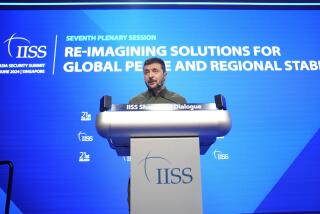Saudis Confirm It: Count Them Out : Diplomacy: Riyadh’s reluctance may have derailed Baker’s ‘two-track’ Middle East peace formula.
- Share via
JIDDA, Saudi Arabia — The government of Saudi Arabia delivered a possibly fatal blow to Secretary of State James A. Baker III’s “two-track” Middle East peace formula Sunday when it confirmed that it will not participate in a proposed regional conference.
“Participation in the meeting traditionally has been the countries that are involved directly in peace negotiations, which are Egypt, Syria, Jordan, Lebanon and Israel,” said Prince Saud al Faisal, the Saudi foreign minister. “I think this format is a workable format, and it’s a practical format,” Saud added in comments to reporters before the start of a meeting with Baker.
Saudi Arabia’s decision to skip the regional conference overshadowed Egypt’s agreement to attend, the first Arab state to announce unequivocally that it will be there if the meeting takes place. Jordan has indicated that it probably would participate but has made no firm commitment.
“The principle of a conference is certainly accepted by Egypt, encouraged by Egypt, and we have no problem in attending this conference to move toward achieving a just peace in the area,” Esmat Abdel Meguid, the Egyptian foreign minister, told reporters after Baker met for about two hours with President Hosni Mubarak.
Earlier this month, Israel announced that it would attend a regional conference co-sponsored by the United States and the Soviet Union and attended by officials of Arab governments and representatives of the Palestinian residents of the occupied West Bank and Gaza Strip.
The conference is a key element of Baker’s initiative, a two-track plan that envisions one-on-one negotiations between Israel and each of the Arab states and between Israel and the Palestinians.
The secretary of state suggested the format after Israel and the Palestinians were unable to agree on a procedure for direct talks.
The plan was intended as a sweetener for Prime Minister Yitzhak Shamir’s government, which is anxious to establish normal relations with Arab governments but has been unwilling to consider giving up any of the land it has occupied since 1967’s Six-Day War in exchange for peace.
U.S. officials hoped the Arab governments would attend, despite a traditional reluctance to recognize Israel, in order to initiate negotiations over Palestinian rights and the status of the occupied territories. But with Saudi Arabia on the sidelines, there is not much left of the two-track approach. King Fahd’s government is the region’s major economic power and a leader of the conservative Arab bloc.
At the same time, there were growing indications that Syria might also pass up the conference. President Hafez Assad continues to insist that the United Nations host the meeting instead of the United States and the Soviet Union. That approach has been rejected by Israel.
Moreover, as Arab participation began to evaporate, Israel also gave indications that it might prefer to stay away, with Shamir’s government stiffening its position in the face of requests from Baker for flexibility on setting up the conference.
Last Friday, Baker suggested several steps that he said could bridge the gap between Israel and the Arabs over procedures for peace talks. The suggestions were kept secret, but Israeli officials have been eager to publicize their opposition to at least some of the points raised.
Israel resists calls by Baker to let Palestinians who live in Jerusalem take part in the proposed conference and insists that the conference be a one-day affair, giving way quickly to bilateral talks between Israel and individual Arab states. Israel wants the Palestinians relegated to a team dominated by Jordan.
“These are principles from which we are not going to back off,” government spokesman Yossi Olmert said Sunday.
In spite of that approach, Olmert denied that Israeli conversations with Baker on the subject had already reached a dead end. “There are many ways to say yes and no,” he said cryptically. “There is no timetable, and we will discuss everything.”
U.S. officials have adamantly refused to discuss the substance of the suggestions made by Baker on Friday, but Israeli newspapers reported Sunday that the secretary of state asked if Israel would attend a regional conference in which the only Arab parties were Egypt and Jordan. That would seem to suggest Washington’s fall-back position in case Syria joins Saudi Arabia on the sidelines.
It is difficult to see how such a conference would appeal to Israel. The Jerusalem government already has a peace treaty with Egypt, and Jordan, although an important player in the peace process, does not have the stature of Syria or Saudi Arabia.
Nevertheless, Israeli Foreign Minister David Levy said Baker will return to Israel on Tuesday to continue the discussions.
Although U.S. officials declined to confirm Levy’s announcement, the official schedule for Baker’s trip, his third to the region in six weeks, is open-ended. He visits Kuwait today and then goes on to Damascus for talks with Assad. But no date has been fixed for him to return to Washington.
Times staff writer Daniel Williams in Jerusalem contributed to this report.
More to Read
Sign up for Essential California
The most important California stories and recommendations in your inbox every morning.
You may occasionally receive promotional content from the Los Angeles Times.












